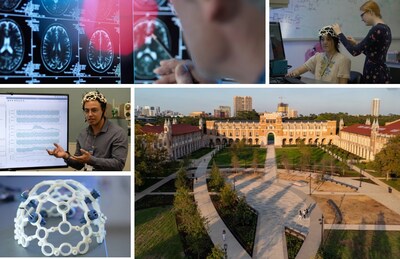Rice launches Brain Institute to accelerate discoveries in brain science and health
HOUSTON, Oct. 29, 2025 /PRNewswire/ -- Rice University has announced the creation of the Rice Brain Institute (RBI), an ambitious, interdisciplinary hub that unites faculty members across campus, including engineering, natural sciences and social sciences, to tackle one of humanity's most complex and promising frontiers: the brain.
The announcement comes at a time when age-related neurological disorders such as Alzheimer's disease, Parkinson's disease and other forms of dementia are increasing worldwide.
"Few areas of research have as direct and profound an impact on human well-being as brain health," Rice President Reginald DesRoches said. "As rates of Alzheimer's, dementia and other neurological diseases rise in our country and around the world, universities have a responsibility to lead the discovery of solutions that preserve memory, movement and quality of life. We all know someone who has been affected by a brain-related health issue, so this research is personal to all of us."
Brain disorders, including mental health disorders such as depression and anxiety, cost the global economy an estimated $5 trillion annually and could reach as high as $16 trillion by 2030, according to the World Economic Forum. Addressing this mounting crisis has become a global imperative, DesRoches said.
"Rice is uniquely equipped to bridge and connect scientific understanding of the brain and behavior sciences with the technologies and policies that shape our world," said Amy Dittmar, the Howard R. Hughes Provost and executive vice president for academic affairs. "By uniting faculty in neuroengineering, neuroscience and psychological sciences, this interdisciplinary hub embodies the kind of bold, nimble collaboration that allows Rice to turn discovery into societal impact to save lives and enhance human flourishing."
Located in Houston, the nation's fourth largest city and most diverse, and at the nexus of Rice and the Texas Medical Center — the world's largest health care complex — the RBI is positioned to become a global leader in brain health innovation. The announcement coincides with efforts to support the Dementia Prevention Research Institute of Texas (DPRIT). Signed into law in May 2025 and headed to voters Nov. 4 as Proposition 14, DPRIT would dedicate $3 billion to neurological research across the state if approved. Its mission is to accelerate discovery, drive commercialization of brain-health technologies and establish Texas as an epicenter for dementia research.
The RBI will bring together three synergistic pillars at Rice — the already established Neuroengineering Initiative and two new ones: the Neuroscience Initiative and the Brain and Society Initiative — to integrate cutting-edge discovery, education and translation into policy and practice. Already, the Neuroengineering Initiative has established a foundation for success with more than $78 million in research funding, a network of more than 50 collaborators across Rice and the Texas Medical Center and partnerships such as the Rice-Houston Methodist Center for Neural Systems Restoration.
"Understanding the brain and addressing neurological and mental disorders requires nothing less than a holistic approach," said Christopher Johns-Krull, interim executive vice president for research at Rice. "The Rice Brain Institute embodies our commitment to interdisciplinary collaboration, connecting fundamental science, engineering innovation and societal context to advance brain health and improve lives."
The RBI's mission is to understand how the brain functions — from molecules to behavior — and to reduce the burden of neurodegenerative, neurodevelopmental and mental health disorders by developing interventions informed by the most advanced brain science. Its researchers will work in thematic clusters focusing on neurodegeneration, mental health, brain injury and neurodevelopment with goals that include significant improvement across key brain health outcomes, including reduced mortality and mental health disorders and improved quality of life for patients living with brain injuries and neurodevelopmental disorders.
"A fundamental understanding of the molecular and cellular processes of neural development and neurodegeneration is the foundation on which all other exploration builds," said Thomas Killian, dean of the Wiess School of Natural Sciences. "Rice has leading experts in these core fields, and the Brain Institute will integrate this with pioneering research in neuroengineering and psychology to accelerate discoveries that help us better understand cognition, memory, emotion and disease — and ultimately translate that understanding into solutions for society."
The institute's structure is unique among peer institutions, leading with engineering-driven innovation rather than traditional neuroscience. This approach will leverage Rice's expertise in soft robotics, neuroimaging, data science and artificial intelligence to design tools that can measure, model and even modulate brain activity in real time.
"At Rice, we lead with engineering," said Luay Nakhleh, dean of the George R. Brown School of Engineering and Computing. "Our focus on developing technology that interfaces directly with the brain — from neural sensors to rehabilitation robotics — positions us to make transformative contributions not just in discovery but in impact."
The Neuroengineering Initiative, founded in 2018, anchors this effort.
"The Neuroengineering Initiative has shown what's possible when we merge engineering with neuroscience," said initiative co-director Behnaam Aazhang, the J.S. Abercrombie Professor of Electrical and Computer Engineering. Jacob Robinson, professor of electrical and computer engineering and bioengineering, will serve as the other co-director. "With the Rice Brain Institute, we're scaling that model and building tools that can both illuminate how the brain works and help restore it when it doesn't."
The Neuroscience Initiative will bring together cell biologists, neurobiologists, biochemists, chemists and physicists across departments to explore the fundamental mechanisms of the brain and nervous system.
"We will tackle the mysteries of the brain from the atomic to the organism level using a unique range of cutting-edge technologies," said Pernilla Wittung-Stafshede, the Charles W. Duncan, Jr.-Welch Professor of Chemistry and co-lead of the Neuroscience Initiative. "Our focus spans from mechanisms of neurodegenerative diseases to brain development and memory storage."
"The brain's complexity demands collaboration," added Rosa Uribe, associate professor of biosciences and co-lead of the Neuroscience Initiative. "By connecting our research across disciplines and from very different angles, we can make discoveries that would be impossible in isolation."
Meanwhile, the Brain and Society Initiative, co-led by Simon Fischer-Baum, associate professor of psychological sciences, situates brain research within the broader social and policy landscape — examining how brain science intersects with education, the work place, justice, technology and public health.
"We want to ensure that breakthroughs in brain science lead to breakthroughs in people's lives," Fischer-Baum said. "That means that we need to understand the human brain in the context of the kinds of complex behaviors that we do in real-world, relevant settings."
"This kind of real-world neuroscience allows for the development of interventions that improve learning, brain health and equity — from schools and workplaces to the national policy level," added Harris Eyre, the Harry Z. Yan and Weiman Gao Senior Fellow for Brain Health and Society at Rice's Baker Institute for Public Policy, senior adviser for neuroscience in the Office of Innovation and co-lead of the Brain and Society Initiative. "The brain is our most valuable asset, and we need to be thinking about policies, interventions and investments that can improve brain health."
"The Rice Brain Institute reflects Rice's strength in collaboration without boundaries," said Rachel Kimbro, dean of the School of Social Sciences. "Our researchers are not only advancing fundamental science but they're also ensuring that knowledge reaches society in ways that promote human flourishing."
Visit the Rice Brain Institute website here.
About Rice University
Located on a 300-acre forested campus in Houston, Texas, Rice University is consistently ranked among the nation's top 20 universities by U.S. News & World Report. Rice has highly respected schools of architecture, business, continuing studies, engineering and computing, humanities, music, natural sciences and social sciences and is home to the Baker Institute for Public Policy and Kinder Institute for Urban Research. Internationally, the university maintains the Rice Global Paris Center, a hub for innovative collaboration, research and inspired teaching located in the heart of Paris, and Rice Global India in Bengaluru, India. With 4,776 undergraduates and 4,104 graduate students, Rice's undergraduate student-to-faculty ratio is just under 6-to-1. Its residential college system builds close-knit communities and lifelong friendships, just one reason why Rice is ranked No. 1 for lots of race/class interaction and No. 7 for best-run colleges by the Princeton Review.
![]() View original content to download multimedia:https://www.prnewswire.com/news-releases/rice-launches-brain-institute-to-accelerate-discoveries-in-brain-science-and-health-302598912.html
View original content to download multimedia:https://www.prnewswire.com/news-releases/rice-launches-brain-institute-to-accelerate-discoveries-in-brain-science-and-health-302598912.html
SOURCE Rice University



